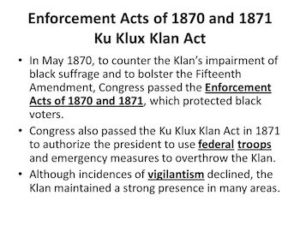
*On this date in 1871, the 42nd United States Congress passed the Enforcement Act of 1871, and President Ulysses S. Grant signed it into law.
Also known as the Civil Rights Act of 1871, Force Act of 1871, Ku Klux Klan Act, Third Enforcement Act, or Third Ku Klux Klan Act, it empowered the President to suspend the writ of habeas corpus to combat the Ku Klux Klan and other white supremacy organizations. The act was the last of three Enforcement Acts passed by the United States Congress from 1870 to 1871 during the Reconstruction Era to combat attacks upon the suffrage rights of African Americans. This bill brought in its early history, this act was used along with the Force Act to bring to justice those violating the Civil Rights of newly freed African Americans.
In February 1871, Congressman Benjamin Franklin Butler of Massachusetts introduced his anti-Klan bill, intended to enforce the Fourteenth Amendment and the Civil Rights Act of 1866. Butler's bill was narrowly defeated in the House, whereupon Rep. Samuel Shellabarger of Ohio introduced a substitute bill, only slightly less sweeping than Butler's original. The statute has been subject to only minor changes since then but has been subject to roomy interpretation by courts. The President’s request resulted from the reports he received of widespread racial threats in the Deep South, particularly in South Carolina. He felt he needed to have his authority broadened before effectively intervening.
After the act's passage, the president had the first power to suppress state disorders on his initiative and suspend the right of habeas corpus. The President did not hesitate to use this authority numerous times during his presidency. As a result, the first-era KKK was completely dismantled and did not resurface in any meaningful way until the first part of the 20th century. Several of its provisions still exist today as codified statutes. The most important of these is 42 U.S.C. § 1983: Civil action for deprivation of rights. After the end of the Grant Administration and the dismantling of Reconstruction under Rutherford B. Hayes, enforcement of the Act fell into disuse, and few cases were brought under the statute for almost a hundred years.
Several of the act's provisions still exist today as codified statutes. The most important of these is 42 U.S.C. § 1983: Civil action for deprivation of rights. The most widely used civil rights enforcement statute allows people to sue in civil court over civil rights violations. Although some provisions were ruled unconstitutional in 1883, the 1870 Force Act and the 1871 Civil Rights Act have been invoked in later civil rights conflicts, including the 1964 murders of Chaney, Goodman, and Schwerner; the 1965 murder of Viola Liuzzo and in Bray v. Alexandria Women's Health Clinic, 506 U.S. 263 (1993), in which the court ruled that "The first clause of 1985(3) does not provide a federal cause of action against persons obstructing access to abortion clinics."
The 1871 Civil Rights Act can be invoked whenever a state actor violates a federally guaranteed right. Today's most common use is to redress violations of the Fourth Amendment's protection against unreasonable search and seizure. Such lawsuits concern false arrests and police brutality, most notably in the Rodney King case. The rise of the Black Lives Matter movement and smartphones video cameras have made Section 1983 lawsuits easier to obtain because of technological advances, including bodycams worn by law enforcement.
The Act was invoked in the 2010 Robbins v. Lower Merion School District case, where plaintiffs charged two suburban Philadelphia high schools secretly spied on students by secretly and remotely activating webcams embedded in school-issued laptops the students were using at home, violating their right to privacy. The schools admitted to snapping over 66,000 web shots and screenshots secretly, including webcam shots of students in their bedrooms. In 2019, the Court held that the 3-year statute of limitations for fabrication of evidence civil lawsuit under section 1983 of the Civil Rights Act begins to run when the criminal case ends in the plaintiff's favor.
In 2020, the United States Court of Appeals for the Fourth Circuit rejected qualified immunity for five Police officers in West Virginia who had kicked, beaten, tased, and finally killed Wayne A. Jones by shooting him 22 times. On February 16, 2021, the Act was asserted in an action in the District Court, D.C., by Rep. Bennie G. Thompson, chair of the House Homeland Security Committee (in his personal capacity) against former President Donald Trump, Trump's attorney Rudolph Giuliani, and the Proud Boys and Oath Keepers. The Thompson v. Trump., et al. case was followed by a subsequent action filed on August 26, 2021, by seven Capitol Police officers, reportedly against the same defendants.